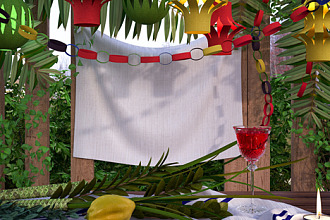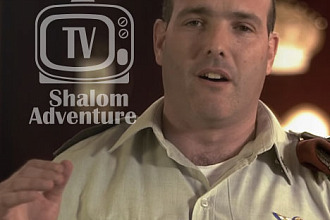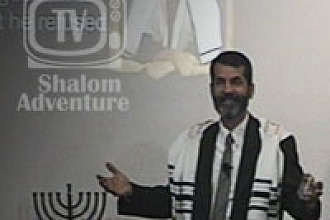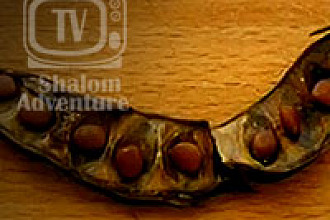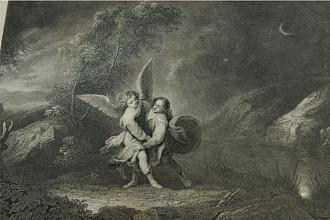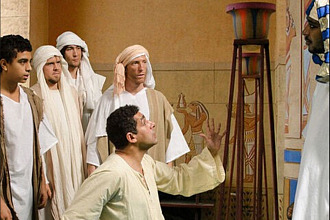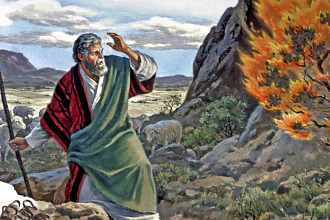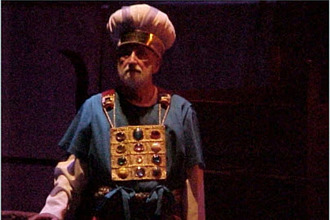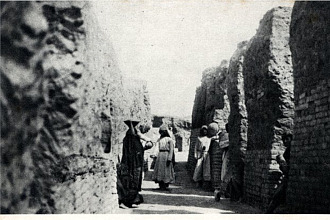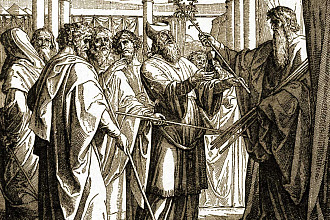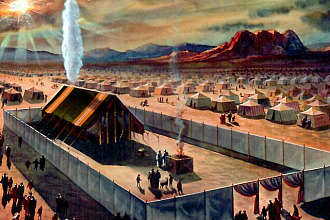Parasha for the Week: Terumah: Exodus 25:1 – 27:19
Haftarah for the Week: 1 Kings 5:26 – 6:13
Besorat Yeshua: Mark 15:1 - 15
Overview
G-d commands Moshe to build a Mishkan (Temple) and supplies him with detailed instructions.
The Children of Israel contribute precious metals and stones, fabrics, skins, oil and spices.
In the Mishkan's outer courtyard are an altar for the burnt offerings and a laver for washing.
The Tent of Meeting is divided by a curtain into two chambers.
The outer chamber is accessible only to the kohanim, the descendants of Aharon.
This contains the table of showbreads, the menorah, and the golden altar for incense.
The innermost chamber, the Holy of Holies, may be entered only by the kohen gadol, and only once a year, on Yom Kippur.
Here is the Ark that held the Ten Commandments inscribed on the two tablets of stone that G-d gave to the Jewish nation on Mount Sinai.
All of the utensils and vessels, for the Mishkan are described in detail.
"The Mishkan"
The five Parashiot, beginning with this week's Parasha, Trumah, to the end of the book of Exodus, describe the Mishkan - the Tabernacle in the desert and the gifts which the people of Israel donated toward its construction
"Take an Offering"
The Parasha begins, "The L-rd spoke to Moshe saying: 'Speak to the Children of Israel, that they take for Me an offering; of every man whose heart makes him willing you shall take my offering..." (Ex 25:1) Why, when speaking about the Israel giving contributions, does the Torah say, "Take for Me an offering"? G-d should have told Moshe to tell the people, "that they shall give for Me an offering?" This Parasha teaches us the proper attitude and approach to giving tithes and offerings. Our sages explain that when we give we should know that in reality we are "taking." For we get far more in return than what we give.
"Pure Inside"
The Torah states, "Cover (the ark) with a layer of pure gold on the inside and outside and make a gold rim all around its top." (Ex. 24:11) Why was it necessary to cover the ark with gold on the inside? The Talmud (Tractate Yoma 72b) comments that from here we see symbolized that a Torah scholar must be pure inside as well as outside. That is, just as the ark which symbolized Torah knowledge had gold on both the inside and the outside, so too a Torah scholar is not someone who just speaks wisdom on the outside, but he must also internalize his wisdom and live with it. Our lesson: Whenever you speak about lofty thoughts, ask yourself whether you actually follow the principles you speak about. If not, do not stop speaking about those ideals, rather you should elevate your behavior.
"Generous Offerings"
For the building of the sanctuary great and expensive preparations were necessary; a large amount of the most precious and costly material was required; yet the Lord accepted only freewill offerings. "The L-rd said to Moses: Tell the Israelites to take for me an offering; from all whose hearts prompt them to give you shall receive the offering for me." (Ex 25:1) was the divine command repeated by Moses to the congregation. Devotion to G-d and a spirit of sacrifice were the first requisites in preparing a dwelling place for the Most High.
All the people responded with one accord. "They came, every one whose heart stirred him up, and every one whom his spirit made willing, and they brought the Lord's offering to the work of the tabernacle of the congregation, and for all His service, and for the holy garments." (Ex 35:21). The Torah states: "And have them make me a sanctuary, so that I may dwell among them". (Ex 25:8).In the building of the sanctuary as a dwelling place for G-d, Moses was directed to make all things according to the pattern of things in the heavens. G-d called him into the mount, and revealed to him the heavenly things, and in their similitude the tabernacle, with all that pertained to it, was fashioned. So to Israel, whom He desired to make His dwelling place, He revealed His glorious ideal of character. The pattern was shown them in the mount when the law was given from Sinai.
"Giving is an Investment"
A farmer brought his produce from the farm to the wholesaler. Since he couldn't read nor write, he devised the following way to make his calculations as to how much the wholesaler bought. The farmer placed his hat on the table and for every bag of potatoes, the customer would put a penny into the farmer's hat. At the end they would count the pennies in the hat and thus know how many sacks he bought and charge him accordingly. But from time to time, as the customer was busy carrying the sacks of potatoes, the silly farmer would put his hand into his hat and steal some of the money. He figured that this way he will make a few more dollars. The customer, didn't care knowing that the fewer pennies in the hat the less sacks he will be paying for. Thus, the silly farmer figured he was stealing from the customer, when in fact he was cheating himself! The same is with charity. The truth is that giving is an investment for G-d's blessings for future success. When we hold back what G-d intended us to give away, we are in reality cheating ourselves. For in the end, G-d counts what's in the "charity account" and sends His blessings for future success accordingly.
Haftarah: 1 Kings 5:26 – 6:13
Haftarah: The Sanctuary was used by Israel for about four hundred years before Solomon built the Temple in Jerusalem: "In the four hundred and eightieth year after the Israelites had come out of Egypt, in the fourth year of Solomon's reign over Is¬rael, the second month, he began to build the temple of the LORD." (1 Kings 6:1). "The word of the LORD came to Solomon: "As for this tem¬ple you are building, if you follow my decrees, carry out my regulations and keep all my commands and obey them, I will fulfill through you the promise I gave to David your father. And I will live among the Israelites and will not abandon my people Israel." (1 Kings 6:11-13). The spot on which the temple was built had long been regarded as a consecrated place. It was here that Abraham, the father of the faithful, had revealed his willingness to sacrifice his only son in obedience to the command of the L-rd. Here G-d had renewed with Abraham the covenant of blessing, which in¬cluded the glorious Messianic promise to the human race of deliverance through the sacrifice of the Son of the Most High. "I swear by myself, declares the LORD, that because you have done this and have not withheld your son, your only son, I will surely bless you and make your descendants as numerous as the stars in the sky and as the sand on the seashore. Your descendants will take possession of the cities of their enemies, and through your offspring all nations on earth will be blessed, because you have obeyed me." (Genesis 22:16-18). Here it was that when David of¬fered burnt offerings and peace offerings to stay the avenging sword of the destroying angel, God had an¬swered him by fire from heaven. See 1 Chronicles 21. And now once more the worshipers of Jehovah were here to meet their God and renew their vows of allegiance to Him. (PK37)
Besorat Yeshua Mark 15:1 - 15
Jerusalem is the city that G-d has chosen to built the Temple, to be worshipped and to welcome the Messiah. One of the prophets who preached to rebuild the Temple after the deportation of Babylon, Haggai, said that the glory of the second temple will be greater than the first one built by Solomon. "'The glory of this present house will be greater than the glory of the former house,' says the LORD Almighty. ((Haggai 2:9a) The second Temple had the privilege of hosting the Messiah, who come to save his people 'And in this place I will grant peace,' declares the LORD Almighty." (Haggai 2:9b) Peace will be granted in this second temple, not only through the coming of the Messiah but his sacrifice for us, "the punishment that brought us peace was upon him, and by his wounds we are healed." (Isaiah 53:5).
Parasha: God prepared the way of the Messiah by giving us the sanctuary,
Haftara: God continues to show the way to Messiah in allowing Solomon to build the Temple.
Besorah: Yeshua the Mashiach is in Jerusalem, he came to save his people, to get upon his shoulders the punishment that Israel deserves. According to Isaiah. his sufferings brought us peace. Yeshua revealed that he was the Messiah-King of Israel "Are you the king of the Jews?" asked Pilate. "Yes, it is as you say," Y'shua replied." (Mark 15:2).
However the prophecies have to be fulfilled, that is why he was not recognized. It was the custom at the Feast to release a prisoner whom the people requested. A man called Barabbas was in prison with the insurrectionists who had committed murder in the uprising. (Mark 15:6-7). Pilate the Roman governor took the decision to punish Yeshua: Pilate released Barabbas to them. He had Yeshua flogged, and handed him over to be crucified. (Mark 15:15)



